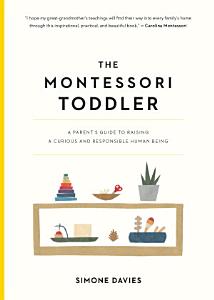|
I love to read. I love the feeling of staying up ridiculously late to finish your book. I love getting the email that a book I had on hold is ready. I love providing our daughter with books about almost everything. When I got pregnant, I thought I'd read. I bought What to Expect When You're Expecting and Ina May's Guide to Childbirth and Natural Childbirth the Bradley Way and How to Talk So Your Kids Will Listen & Listen So Your Kids Will Talk. I'd get through a few pages of each and lose interest (no surprise, nonfiction isn't really my thing). I learned best through short articles and Google searches and doctor visits and the very best due date group on Facebook. I gave up on reading any sort of book for parents. Then I somehow came across this gem. The Montessori Toddler: A Parent's Guide to Raising a Curious and Responsible Human Being by Simone Davies. I couldn't stop. I devoured the ideas Simone presented. I made notes and read sections to Austen. I loaned it to my sweet friend who watches Addy 3 days a week. I read it again. I started listening to Simone's podcast. When I was a child I attended a local Montessori preschool and although I have no memories of it, my mother always had rave reviews about the curriculum. The more I learned about Montessori, the more I wanted to implement practices in our home. We are by no means a fully Montessori household, and I absolutely loved the phrase a mom friend in my bomb.com due date group shared, when she said they were 'Montesorta.' Perfectly fitting! Join any Montessori group, and you'll see the phrase over and over: 'follow the child.' Ultimately, it comes down to observing your child and seeing how you can help them extend their learning where they are, where their curiosity and development is striking. Knowing this, we have some key principles and practices in place at our home as we support Addy's development. 1. A prepared environment Our home is for our entire family. I continue to make changes to make the house accessible for Addy. I provide items for her on her own level and kid-sized tools whenever possible. Here are some of her favorites- her own kitchen in our kitchen, her learning tower that flips to be a little table, and her work table in the living room. 2. Thoughtful materials Please don't think a toy has to be expensive, all wood, color neutral to help shape a child's learning in Montessori fashion. The playrooms you'll see featured on Pinterest are beautiful, but definitely staged and representative of only a tiny percent of actual playrooms. I can't afford the $60 Grim's stacking cup set, but the $4 plastic stacking cup set has been a hit since Addy was just months old. Not many toys can say that! I am picky about books and choose literature that represents the diversity of the world, introduces Addy to new concepts, and provides affirming messages. We decide what items are worth spending more on and invent wisely. Addy loves animal figures and we practice matching them to 2-D representation on flash cards. Austen prefers the Schleich animals because they are a much nicer quality, full of little details for each animal. 3. Outdoor time I don't like getting dirty. I don't like bugs. I don't like being rained on or sledding in the snow. For the joy of my child, I'll do it all. I'll smile and take pictures and find the fun in it, daggone it! We get outside everyday unless there's just absolutely no way. We employ rain gear and snow boots and sun hats. Addy takes walks, works in the tiny garden, scribbles with chalk, helps with chores, and just explores. 4. Responsibility I have truly been in awe at the things Addy can do, when she's given the chance to learn. When we involve her in work and really let her do it *herself* she absorbs it and carries that knowledge into the future. Read this article from NPR- it's great information!! Here are the two main takeaways: -To raise helpful children, they need to be involved in the work of the family -Asking children to complete 3 subtasks an hour (small steps of the bigger job) involves them and helps them learn without overwhelming Best of all? Younger kids needed more requests while older children needed fewer, because "they learned how to be helpful and cooperate." 5. Respect Addy is her own person and deserves to be respected as such. This is not just a Montessori principle but a good parenting principle. We try to respect her choices as much as we can, such as providing bodily autonomy (don't want a hug? no hugs!) and providing opportunities to make her own choices (such as choosing which shoes to wear). We show respect by gently setting boundaries and enforcing them, with words and without physical punishment. We also teach respect for the environment around us, our belongings, and other people. There will never be one perfect way to parent your child. Montessori isn't the be all end all, and it isn't perfect either. However, implementing some of these principles can have amazing effects on your child's independence, confidence, and relationships with others!
0 Comments
Leave a Reply. |
CategoriesArchives
December 2021
|









